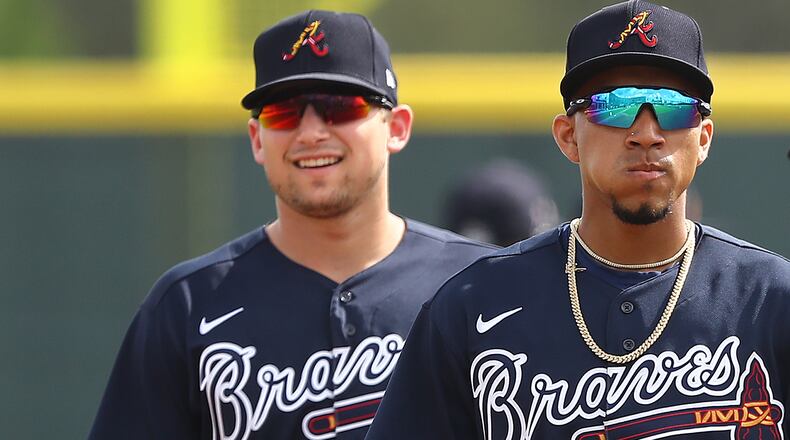As Johan Camargo and Austin Riley duke it out for the Braves’ third base job, one thought has always lurked on the peripherals of the conversation.
“Why not both?”
It’s reasonable to at least entertain the concept. Playing time would be divided, though it helps both players are capable of manning other positions. On the other hand, the Braves would be sacrificing at-bats for each.
Riley is a young, developing slugger who needs every-day playing time. The Braves saw Camargo struggle with sporadic at-bats last season, when he shifted into a utility role after the Braves signed Josh Donaldson.
With those realities in mind, the Braves deem it unlikely, even perhaps unrealistic, to carry both players on the initial opening day roster and get each of them regular playing time. They’d rather the loser of the competition playing every day in Triple-A Gwinnett.
“That all sounds good,” manager Brian Snitker said of the thought. “That’s like, sometimes you have meetings at 4 o’clock in the afternoon and everything sounds really good, then at 9:30 (p.m.) it’s blown up when the game starts. I don’t know that realistically, can you get both guys (ample playing time)? No, I don’t know that you can do (them) justice. If you’re not playing every day, you’re not going to do justice with things. You talk about it, it sounds good, but in reality, it’s not that easy to do.”
Riley and Camargo were in the lineup together for the first time Saturday, when each had two hits in the Braves' 12-0 win over the Rays. Riley is 4-for-13 in his first five games, while Camargo has gone 4-for-12 with a homer and two RBIs in the same span.
“Both of them have done really well,” Snitker said. “I love where Austin is offensively. Camargo (the same). They’re going to make it tough. Hopefully it is. We have a long way to go and they’ve both been really good. They both are doing what we hoped they would do.”
Camargo is considered the heavy favorite, and the likeliest outcome remains him handling third-base duties while Riley returns to Gwinnett. If that’s the scenario, Riley could still obviously find his way to the majors soon enough, helped by his ability to also play first base and left field.
Snitker has been impressed with Camargo’s athleticism, which looks much more fluid in his leaner state. The 26-year-old spent the winter getting into better shape, and he’s looked much smoother fielding and running the bases.
Camargo admitted there was extra motivation last offseason, not only because of his underwhelming 2019, but because he knew should Donaldson depart in free agency, third base would be his to lose. Camargo simply didn’t take well to his utility job, playing poorly enough to be sent to Triple-A. He looked much better upon returning but a foul ball off his shin ended his season in early September.
Riley’s Achilles heel was his strikeout rate, which was almost 40 percent in his rookie season. In the minuscule five-game spring sample, Snitker has noticed progress, praising Riley for making contact and laying off some pitches he would’ve attacked last year. The 22-year-old has struck out once in 13 at-bats.
Just 22, the Braves don’t want Riley to be relegated to a bench bat. The only way to continue improving his pitch selection is to be playing. In other words, it makes little sense from their perspective to marginalize one of Riley’s or Camargo’s development.
“We saw how (inconsistent playing time) affected Camargo last year,” Snitker said. “It wasn’t real good. I don’t know that they have the experience to be that guy, that versatile guy yet, that we want. When we had a guy like Omar Infante that was really good, he’d had a few years under his belt. These guys don’t have the years under their belt to fill that.
“With the makeup of this club, you’re not going to get to play a lot really. You’re going to be involved in games and used in games, but as far as starting, we’ve got every-day players here. When you start the season and you have an infield with three out of the four are every-day guys. They’re going to play the majority of the snaps.”
So ultimately, it might wind up a tougher decision than even the Braves expected. They’d welcome the conundrum.
About the Author
Keep Reading
The Latest
Featured



